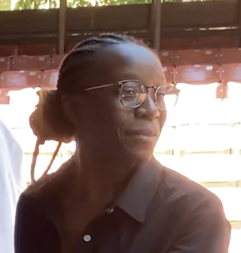|
Alexa Joubin presented to us on “Radical Listening & Global Shakespeare.” During her presentation, Alexa provided us with access to MIT’s Global Shakespeare site which had various scenes from movies & reenactments of some of his plays. Alexa taught us that by looking at various scenes from the same play, from different cultures and time periods, teachers can assist students in finding their own meaning when watching and reading Shakespeare. This allows for Shakespeare’s works to become their own.
My favorite part of Alexa’s presentation was her ideas on visual language. She made a point to emphasize that it is very easy to assess and analyze a scene even if you do not speak the same language. A visually striking performance can tell the same story as a performance in a person’s native language. I do believe teaching students how to analyze and understand visual language is a great tool to help them draw (no pun intended) their own conclusions from plays such as Haider. Getting the chance to recognize that Shakespeare is translational is a big piece of what Alexa discussed. She gave us the chance to review the Duke’s famous lines in Othello, “if virtue no delighted beauty lack, your son-in-law is far more fair than black." When looking at these lines, Alexa provided a website that translated these lines in as many languages as possible. By doing so, she made a very important point. Everyone can translate and interpret Shakespeare’s words differently. It is important to recognize the choices a translator makes or doesn’t make. There is a choice to be symbolic or problematic in translating these lines. An exercise like this is a great way to get students more involved in the text they are reading but also allow them to recreate lines like these that they may have an issue with. Alexa’s presentation was super engaging and super informational. I cannot wait to use the resources she provided in my future classroom! Thank you Alexa!
0 Comments
Leave a Reply. |
Author25 teachers gathered in Ogden, Utah to work together and learn about Shakespeare and Adaptation from three regular and several visiting faculty. These are their stories. ArchivesCategories |
Transforming Shakespeare's Tragedies: Adaptation, Education, and Diversity has been made possible in part by a major grant from the National Endowment for the Humanities: Democracy demands wisdom.
Any views, findings, conclusions, or recommendations expressed on this website do not necessarily represent those of the National Endowment for the Humanities

 RSS Feed
RSS Feed



